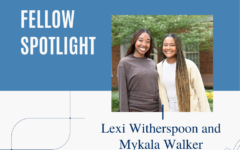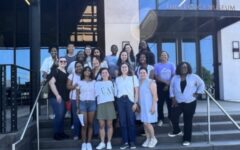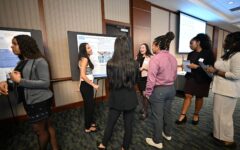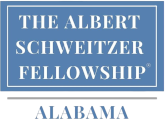FELLOW SPOTIGHT: THIS FELLOW IS WORKING TO REMOVE BARRIERS TO BREASTFEEDING FOR BLACK MOMS
October 30, 2025 2025-11-03 15:12FELLOW SPOTIGHT: THIS FELLOW IS WORKING TO REMOVE BARRIERS TO BREASTFEEDING FOR BLACK MOMS

FELLOW SPOTIGHT: THIS FELLOW IS WORKING TO REMOVE BARRIERS TO BREASTFEEDING FOR BLACK MOMS
By: Javacia Harris Bowser
For her Albert Schweitzer Fellowship project, 2025-26 Fellow Abby Bell is striving to help increase breastfeeding rates in African American women in Alabama to improve maternal and infant outcomes.
Breastfeeding provides protection against diseases that disproportionately affect African American women, such as type 2 diabetes, hypertension, breast and ovarian cancers, and cardiovascular disease. Furthermore, research has shown infants who are breastfed have reduced risks of asthma, obesity, Type 1 diabetes, lower respiratory tract infections, severe diarrhea, ear infections and sudden infant death syndrome.
But facts like these weren’t Abby’s only motivation for taking on her project.
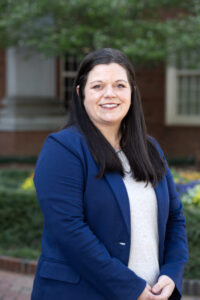
“I used to be a labor and delivery nurse, and so I was around women from all different walks of life, and they all had very different reasons for wanting to feed their child the way that they did,” Abby said. “And when having my own children, I was the first of all my friends to have babies, so it was all new territory for me. I didn’t really feel like there was breastfeeding support in the community. It was just me kind of fumbling through it on my own.”
For Abby, breastfeeding and lactation education aren’t just professional pursuits – it’s personal.
She’s teamed up with the Chambers County Health and Wellness Center to offer workshops on breastfeeding and to organize a support group, in hopes of specifically helping African American moms.
Despite her personal experience with breastfeeding challenges, Abby knows her overall life experience is different from that of the women she’s seeking to serve. This makes getting feedback on the curriculum she’s developing crucial. She’s spent the summer months meeting with African American moms one-on-one to learn more about the barriers to breastfeeding that Black women face and how to remove them.
“I really want this education resource and this support group to be something that is relevant to this population and not just what I think they want to hear, because I think sometimes that can be very different things,” Abby said, adding that she’s open to tweaking the breastfeeding curriculum she’s developed as much as needed to be sure it’s impactful. The curriculum covers breastfeeding basics as well as how to troubleshoot issues moms may face when breastfeeding.
During her one-on-one chats with Black moms, Abby has learned a lot about the things that can sometimes keep African American women from breastfeeding. Some worry that breastfeeding will make it difficult or impossible to return to work. There’s also the painful history of enslaved Black women being forced to wet nurse the children of plantation owners. Abby plans to bring in guest speakers to both acknowledge this historical context and to address common misconceptions about breastfeeding.
Abby, who’s currently a student at Auburn University’s College of Nursing, hopes to one day be a professor of nursing.
“Part of that role is service and outreach,” she said. And Abby plans to continue to focus her community service on breastfeeding.
“I would love to even pursue my lactation consultant certificate,” she added.
Meanwhile, she’s confident her time with the Albert Schweitzer Fellowship will help prepare her for any service projects she takes on in the future.
“This will help me really understand how to do a project from start to finish, how to keep it going, and how to alter it to meet the needs of whatever community I’m serving,” she said.

